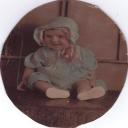Yahoo Answers is shutting down on May 4th, 2021 (Eastern Time) and the Yahoo Answers website is now in read-only mode. There will be no changes to other Yahoo properties or services, or your Yahoo account. You can find more information about the Yahoo Answers shutdown and how to download your data on this help page.
Trending News
How many of you still think records are reliable? How many of you think whites are white, blacks are black?
unless their ancestors were slaves? Read this online article: http://genforum.genealogy.com/melungeon/messages/1...
3 Answers
- Shirley TLv 71 decade agoFavorite Answer
Records are usually just as good as the informant's knowledge and the understanding of the person taking down the information. I have seen information I knew was wrong. On a death certificate of one of my great grandfather's brothers it gives the name of his father as John when it was Thomas. His son who gave the information I don't believe was born before Thomas died.
One of my great great grandmother's maiden name was Dumas(pronounced Doo-MAH. When I got a copy of the death certificates on one of her sons who remained in NC it showed her name as Dummah.
In Southeastern states they frequently pronounce words like they do in England using the short A for Amen (ah men) say wawter for water which is exactly like they do in England. However when I saw the death certificate I realized that people in NC and Georgia would say Dum Mah not DooMAH. Just a little problem in diction. You have to under John's children were born after his parents left NC and wound up in Texas. They probably never saw how her name was spelled. They couldn't come visit Grandma on their summer vacation in the 1800s.
Census records I have found several errors and I think everyone has. However I believe in the long run records are the most reliable thing to use in genealogy. Without them you just don't have a very verifiable tree.
Living in the South I know many black people are mixed. How many whites have black ancestry I think it is rare except Louisiana or the part of Texas where I live which is about 30 milies from Lake Charles. Those people with black ancestry that could pass as white and wanted to be considered white left the South and moved where no one knew their ancestry. A good many people with ancestry in the Carolinas and Georgia have some Amerindian ancestry. Despite the fact that one of my cousins, Andrew Jackson was very rough on the Indians and prejudice against blacks has been noted by many historians, in the long run the people of the southeastern states were more broad minded toward the Indians than those of other parts of the country and Amerindian ancestry is in quite a few.People mistakenly identify the South as guilty of all type of prejudice. I have had people say that my Catholic ancestors who arrived through Savannah the first part of the 1800s and later moved to north Georgia and north Alabama descendants left the Catholic church due to prejudice in those areas. However during that time period Catholics were prejudice against everywhere. In the South they were isolated. The Bishop of Savannah where they received large Irish immigrations states they never saw any "No Irish Need Apply" signs and the No Nothing Riiots were in the Philadelphia, not the South. Melungeons are in a small part of Appalachia. I have heard of only one Melungeon family where I live in Southeast Texas.
Edit: I might add in Louisiana is where you hear of people being quardroons, octoroons etc. One night a group of us were discussing this and I flippantly added Muldoon. Father Pat said Muldoon had nothing to do with it. There is a funny story here. Under Santa Ana only Catholics could own land. There was a priest, Father Muldoon who went around giving Anglos baptismal certificates so they could buy land. Some say he became helpful with a few spirits in him not necessarily the Holy Spirit.. Those who "baptised" were called Muldoon Catholics. The fallen heroes of the Alamo are buried in Fernando Cathedral in San Antonio and very few of them were actually Catholic.
- MaxiLv 71 decade ago
For family history cited records are all we have to work with, although many genealogist use collected information for building their tree ( which are far from good sources of information) and the more you use transcribed information the easier it is that they are wrong which is why you use them only as a way to get the record number and check that before you 'believe ' it and the better websites have scans of the primary/secondary record for people to check
So cited records...primary if possible and even they are written by humans so human error...to complete misinformation given is possible.
I have around 20 primary and secondary records for one person, my great grandmother and the information is far from correct, I knew the person who gave death certificate information, and for the grave stone and I know she was an honest person, however she was giving information which she was told by her mother and thought it was true ( it wasn't) the census returns are all different ages stated, marriage cert she lies about being older, no birth certificate as it was prior to civil registration, but baptism, early census and manorial records are the same, which I believe is true, I have seen her since in online trees of people who have collected from databases without full record rsearch and they are off researching someone else, so their tree is now a collection of unrelated names.........as many are..............and is another person who my educated and researched guess is that the father of the child is not the one written on the birth certificate..........so I have researched both listed father and the person who in my heart I know is...only DNA will prove this and it is now possibly..however it moves into genetics and thats not genealogy, however in this case I may just go that route to prove it........or when I pass on my tree the information is all there if the next person wants to.............we will see.
But I don't think you are looking at things like that you are looking at families who think they are white, yet have black ancestry they know nothing about.....years ago white friends had their first child, he was born black and the obvious happened...he walked out, filed for divorce while she pleaded she had not slept with anyone black or white.............two years on divorce still in progress she DNA tested and it turned out the child was his child......on researching his family history I found 350 years prior he had a black direct ancestor so........................you never know, but it was recorded and they have a great tree and lots of history, it took another year but they are still together, now have two more children ( both white).........so in this case records were the ones that saved the day as it is tangable, evidenced and understood by all who see it.
- Boomer WisdomLv 71 decade ago
Records are made by humans: humans make mistakes and sometimes lie. And census takers are known for screwing up. Especially when determining race, since there are nearly no "pure" races anymore if there ever were any at all. Of all designations, "Race" is one of the more useless concepts in genealogy. Individual activity is better understood by an individual's religion, culture, nationality, ethnicity or heritage.
As for documents, the only documents I trust are my grandmother's photographs and what's in my wallet.



